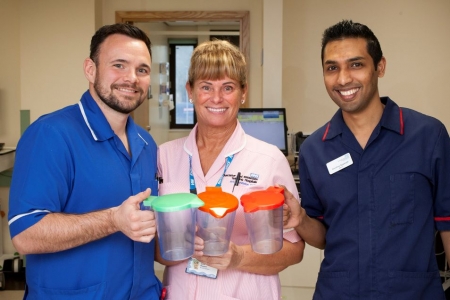
Nursing staff at Doncaster and Bassetlaw Teaching Hospitals (DBTH) are set to implement a number of innovative measures to help patients stay hydrated – a major challenge for health professionals.
By ensuring that inpatients drink enough throughout their time in hospital, there is an association that drinking plenty of water and fluids aids recovery. Dehydration — a condition which occurs when you don't have enough water in your body to carry out normal functions – can be the underlying cause of many common conditions which can complicate a hospital stay.
These can range from constipation, pressure ulcers and also more serious issues such acute kidney injury, cardiac disease and venous thromboembolism (blood clot).
From 25 November 2019 the Trust will adopt a simple, traffic light system using coloured jug lids to monitor the amount that individuals are drinking across the day. This simple visual cue is an easy way for clinicians to see a patient’s fluid intake.
The introduction of traffic light system is DBTH’s approach to reducing dehydration amongst patients. It’s also part of a wider ongoing project called ‘But First a Drink’ initiative, aimed at prompting health professionals to offer a drink and record patients’ fluid balances at the start and end of all their patient interactions with inpatients.
The new system is based on a daily basis as below:
- Each morning, a patient will be given a 750ml jug of water - with a red lid.
- When the patient has drunk their first jug, it will be refilled with fresh water - lid changed to amber.
- Once the patient has had their second water jug, it will be refilled - lid changed to green.
Reaching the green lid stage is significant to this as this shows the patient has drank 1500ml of water which reduces their risk of dehydration.
If nurses are concerned about patient’s water intake, such as if the red lid is still attached by the late afternoon, there are escalation processes to alert senior colleague for further action. Clinicians will also introduce a blue lid for patients with strict fluid restrictions.
Cindy Storer, Acting Deputy Director of Nursing, Midwifery and Allied Health Professionals, said: “Although such a simple concept, by visually monitoring the amount our patients are drinking we can substantially reduce dehydration within our wards. Ensuring you have enough fluids is incredibly important to recovery, and we hope to see improvements in the care we provide following the introduction of our traffic light system later this month.”
